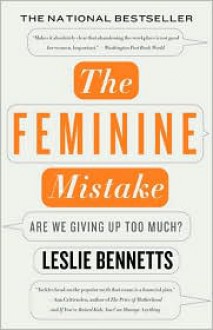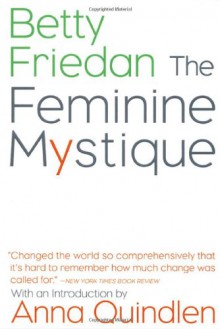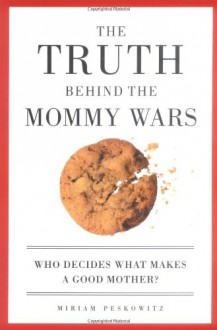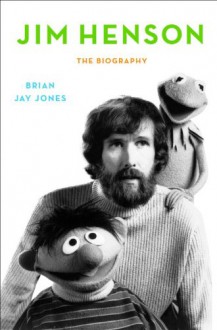I'm about 1/3 through reading The Feminine Mistake by Leslie Bennetts. It's about the dangers of giving up a career to raise children. Although I've always wanted to be a stay-at-home parent while my children are young, now that the prospect is on the horizon, I'm rethinking that long and hard. It seems worth considering what Bennetts has to say while I still can. Below are a few ideas that have particularly struck me.
"My husband makes plenty of money, but he also has a very demanding job. [His] job is extremely stressful, and there are times when I'm complaining about a problem with the kids and he says, 'Don't bother me with this. You don't know what I had to deal with today!' And there are times when I feel angry about that, but the reality is that I have a lot more time than he does." - Susan Yardley*, pgs. 29-30.
I can already see this taking hold with Ivan and me, mainly because I have a more flexible work schedule than he does. Because I have more flexible time, I end up doing most of the repetitive housekeeping tasks -- dishes, laundry, meals. There's so much I want to do that I hardly ever feel like I have "a lot" of time, but I feel somewhat guilty when I know I have more freedom with it than he does. I keep that in mind if resentment creeps in. But resentment remains that the housework I do remains totally unaccounted for -- no pay, and little if any acknowledgment. I don't want to see this gap get much wider, especially if it means my husband is too stressed by work to listen to what I have to say.
"To the extent that there are women who are opting out, they are married to men earning over two-hundred thousand dollars a year and working ninety hours a week. High-income men are married to their jobs, not their families." - Barbara Risman, pg. 36
This also seems worth bearing in mind; I can imagine the pressure of being the sole earner in a household must be immense, and I don't want to live a life where I never see my husband and my children never see their father just so that I can be home full-time. It seems better for both of us to work, but to strive for flexible jobs that would also let us both pick up responsibilities at home. This probably means a simple lifestyle, but that's something we're both already comfortable with -- and it's far preferable than a division of labor that makes one spouse absent except for his financial contribution.
"[T]here are frustrations and obstacles in any career, and when men hit roadblocks, they figure out ways to get around them. For women, however, having children provides the perfect excuse to give up. When full-time mothers discuss their own work histories in greater depth, frustration and disillusionment emerge again and again. Instead of finding more meaningful work, or more flexible work, or figuring out new strategies to overcome barriers, they decided to exit the arena entirely." - pg. 45
This reminds me a lot of the experiences I read about in The Truth Behind the Mommy Wars by Miriam Peskowitz. It also calls to mind Betty Friedan's The Feminine Mystique. Friedan talks about how many women resorted to marrying and becoming housewives right after graduation so they wouldn't have to face the stress and uncertainty of deciding what to do with their lives next. It sounds like women are still using stay-at-home motherhood as a "fallback plan" to avoid making those tough choices. At times, I've felt stressed over finding a work-life balance that I love as I'm on the edge of considering children and the havoc that will wreak with all that. I even imagine that it would be "easier" to make the decision to have children if I was doing work that I didn't like. But reading this, I realize that I am very fortunate to know I like my work, and that I should find a way to hold onto it no matter what. I don't want having a family to become an "excuse" to leave the workforce; there are many "wrong" reasons to have children, and that certainly seems one of them. So while it may be more difficult initially to continue to work with small children, it seems a better long-term investment, not just for our finances, but for my mental health.
"[The view that she was in a support role] was encouraged by her husband, even as [Donna] Chatsworth wrote and published five books. 'He referred to them as "your little books,"' she recalls. 'He also wrote books, so there was some competition around those issues; he always pointed out that my books never made the bestseller list, but his books didn't either.'" - pg. 73
This makes me so incredibly mad. Men who treat their wives this way really don't deserve to have wives. I don't think the "luxury" of staying home with children and/or doing work that you enjoy is worth the daily humiliation of living with a man who doesn't respect what you do, paid or not. It also makes me incredibly grateful for a husband who doesn't say sh*t like this.
"Being a mom is a tempt job, and if you take that temp job and become completely dependent on your spouse, that makes you so vulnerable." - Sylvia Law, pg. 100
I was glad to see this put into words someplace outside my own psyche. Although the decision to have children will impact your life forever, and although you will be a parent forever no matter what happens, childhood itself is actually very short -- the time when children are wholly dependent on adult care even shorter. Some people stay in the same job for 50 years, while parenting dependent children lasts 18 years per child at most, and most people would argue that active parenting at least scales back to "part-time" once children are in school. This is one of the things that makes me want to give as much as I can while my kids are small, since it won't last long -- but it also strengthens my resolution to do at least some work during that time. Parenting young children and working for pay doubtless requires a lot of effort, time, and energy, but that phase doesn't last forever. That's also one of the things that makes having children seem doable to me -- the fact that, someday, they'll grow up, and my own interests and work will remain. That's encouraging rather than depressing to me, and I think more women need to remember this big picture context. Kids might be an easy and acceptable "out" of the work world for a time, but they're not kids forever, or even very long. Deciding what comes next seems a lot more doable if you learned what you want and who you are before the little ones come along.

 Log in with Facebook
Log in with Facebook 















